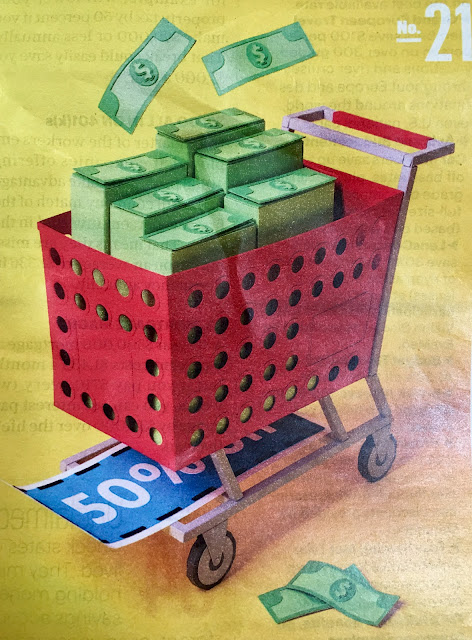AARP article salutes
rise of industrial farms,
processed food, multicookers
By VICTOR E. SASSON
EDITOR
HACKENSACK, N.J. -- The only upside to the Covid-19 pandemic is that Americans in quarantine or lockdown began to cook again and "the family meal -- long threatened -- returned in earnest."
That's the upbeat conclusion of a sweeping review of how we eat by Ruth Reichl, a cookbook author and onetime restaurant critic for The New York Times.
But in "The Changing American Table" for AARP The Magazine, Reichl acknowledges that Americans' obsession with baking and desserts pushed the percentage of us who are overweight or obese to about 72 percent today, compared to only 10 percent in 1950.
She discusses the rise of factory farms, the widespread use of human antibiotics to make farm animals grow faster, salmonella outbreaks, processed food and even a best seller, "The Can-Opener Cook Book."
Eating is learned behavior
Reichl, who has written about food for 50 years, acknowledges her own articles about eating fewer carbohydrates, exercising more and drinking less or not at all.
"The real answer, I think, is staring us in the face," Reichl says. "Eating is learned behavior, and from the moment our children are born, we began teaching them that the most delicious foods are filled with fat, sugar and salt."
Organic farming
Although Reichl is one of the most respected food writers in the nation, her AARP article is weak when it comes to discussing the benefits of eating organic food, and the harm of pesticides and the antibiotics used to raise poultry, meat and farmed fish.
"People who care about the environment ... have driven the cause of organic farms, whose numbers have doubled in the past 10 years," she says, adding:
"But the most revolutionary changes in food production revolve around meat. Research has shown that a meat-based diet increases the risk of heart diseases and cancer."
Excerpts
Here are excerpts from Reichl's article for older Americans, and I think you can assume that the "average Americans" she mentions aren't eating pricier organics, antibiotic-free food, wild-caught fish or 100% grass-fed beef:
- "The food on my table -- and yours -- does not resemble in any way what our ancestors ate."
- "Food prices have come down so dramatically that average Americans spend a mere 7 percent of their budget on it -- less than people spend in any other nation on earth."
- "Three-quarters of us are overweight, and 6 out of 10 of us suffer from chronic illnesses such as diabetes, heart disease, asthma and hepatitis."
- "Does our cheap food have anything to do with that?" (Her answer is yes.)
- "After the war [World War II] ended and the Cold War began, our government decided that growing bigger, better and substantially more food than the Soviets ... would be a great way to spread democracy."
- On family summer road trips, regional specialties were replaced by fast food.
- "By the mid '50s ... housewives filled their freezers with three iconic foods of that moment: TV dinners, fish sticks and Tater Tots."
- "Instant mashed potatoes, freeze-dried instant coffee, Pop-Tarts, Tang and, of course, Carnation Instant Breakfast began to line our cupboard shelves."
- "Mom bragged she could get dinner on the table in 15 minutes flat."
"The coronavirus disrupted the American food supply, and it changed the way I shop, cook and eat," Reichl says.
"Indeed, across the country, people in lockdown began to cook again" and "many who had never before put their hands into dirt planted gardens ...," she says.
"People like me, who live in rural parts of the country, began buying our food straight from the farm, just like my mother once did," Reichl adds. "I know I'll be doing that for the rest of my life."
To read Reichl's piece in its entirety, click on the following link:
A foodie reflects on 50 years of change
Shopping for organics
During most of the year, the closest my family and others in northern New Jersey get to the farm is Whole Foods Market in Paramus, where I buy as many organics as possible.
Costco Wholesale in Teterboro and ShopRite supermarkets also are good sources for organic produce, organic pasta and other organically grown food.
I grew up in a kosher household in Brooklyn, N.Y., where the family meal was sacred, and I've been cooking all my life, both when I was single and after I married.
That has continued during the pandemic.
I'm a pescatarian living with a wife, son and mother-in-law who eat meat and poultry, so we cook more than most families and find it challenging to order takeout once a week.
For ideas on preparing family meals, see my cooking and food shopping videos:
















